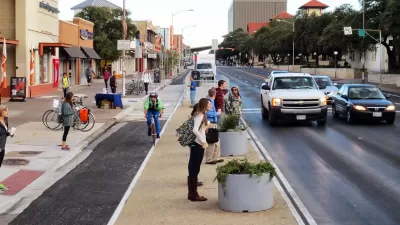As a leading cause of death in the U.S., car collisions are one of the country's foremost public health problems. But a review of the last century of medical literature reveals increasing reluctance by the profession to weigh in on the subject.
Angie Schmitt speaks with David Jones, the A. Bernard Ackerman Professor of the Culture of Medicine at Harvard, who "charted the fascinating historical trajectory of how physicians’ views on driving-related health risks have shifted, in an article that was itself published in the [New England Journal of Medicine] earlier this month."
Though the public health threat posed by automobiles was repeatedly debated by doctors in the first half of the 20th century, the subject waned in significance in recent decades.
For instance, "Despite an article in the most recent edition of the Journal finding that distracted driving is associated with significantly increased crash rates among both novice and experienced drivers, Jones says doctors still don’t seem to be comfortable taking decisive action to prevent these kinds of collisions," notes Schmitt.
So what's a proactive way that doctors could help prevent such collisions? Jones offers an example:
One of my colleagues, Amy Ship, who works at the Beth Israel [Deaconess Medical Center] in Boston, she said she routinely asks her patients, “Do you text and use cell phones while you drive?” If they say yes, she reads them the riot act. And it’s her opinion that all doctors should do that. What percentage of doctors ask patients about this? I bet it’s close to zero.
FULL STORY: What Should Doctors Do to Prevent Traffic Deaths?

Alabama: Trump Terminates Settlements for Black Communities Harmed By Raw Sewage
Trump deemed the landmark civil rights agreement “illegal DEI and environmental justice policy.”

Planetizen Federal Action Tracker
A weekly monitor of how Trump’s orders and actions are impacting planners and planning in America.

How Atlanta Built 7,000 Housing Units in 3 Years
The city’s comprehensive, neighborhood-focused housing strategy focuses on identifying properties and land that can be repurposed for housing and encouraging development in underserved neighborhoods.

In Both Crashes and Crime, Public Transportation is Far Safer than Driving
Contrary to popular assumptions, public transportation has far lower crash and crime rates than automobile travel. For safer communities, improve and encourage transit travel.

Report: Zoning Reforms Should Complement Nashville’s Ambitious Transit Plan
Without reform, restrictive zoning codes will limit the impact of the city’s planned transit expansion and could exclude some of the residents who depend on transit the most.

Judge Orders Release of Frozen IRA, IIJA Funding
The decision is a victory for environmental groups who charged that freezing funds for critical infrastructure and disaster response programs caused “real and irreparable harm” to communities.
Urban Design for Planners 1: Software Tools
This six-course series explores essential urban design concepts using open source software and equips planners with the tools they need to participate fully in the urban design process.
Planning for Universal Design
Learn the tools for implementing Universal Design in planning regulations.
Caltrans
Smith Gee Studio
Institute for Housing and Urban Development Studies (IHS)
City of Grandview
Harvard GSD Executive Education
Toledo-Lucas County Plan Commissions
Salt Lake City
NYU Wagner Graduate School of Public Service





























